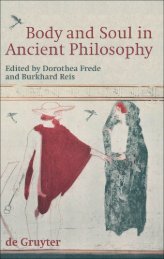Empedocles Redivivus: Poetry and Analogy in Lucretius
Empedocles Redivivus: Poetry and Analogy in Lucretius
Empedocles Redivivus: Poetry and Analogy in Lucretius
Create successful ePaper yourself
Turn your PDF publications into a flip-book with our unique Google optimized e-Paper software.
Introduction 9<br />
omnis natura creet res auctet alatque / quoque eadem rursum natura perempta<br />
resolvat / “<strong>and</strong> I shall disclose the first-beg<strong>in</strong>n<strong>in</strong>gs of th<strong>in</strong>gs, from which<br />
nature makes all th<strong>in</strong>gs <strong>and</strong> <strong>in</strong>creases <strong>and</strong> nourishes them, <strong>and</strong> <strong>in</strong>to which<br />
the same nature aga<strong>in</strong> reduces them when dissolved,” 1.55–57). 40 Moreover,<br />
he himself stresses the impossibility of someth<strong>in</strong>g be<strong>in</strong>g created out of<br />
noth<strong>in</strong>g <strong>and</strong> of someth<strong>in</strong>g be<strong>in</strong>g reduced to noth<strong>in</strong>g (1.146–328: e.g. nullam<br />
rem e nilo gigni div<strong>in</strong>itus umquam. / “no th<strong>in</strong>g is ever by div<strong>in</strong>e power<br />
produced from noth<strong>in</strong>g,” 1.150; Nunc age, res quoniam docui non posse creari<br />
/ de nilo neque item genitas ad nil revocari / “Now then, s<strong>in</strong>ce I have taught<br />
that th<strong>in</strong>gs cannot be created from noth<strong>in</strong>g <strong>and</strong>, when brought forth, cannot<br />
be brought back to noth<strong>in</strong>g,” 1.265–266). Although <strong>in</strong> these fundamental<br />
propositions <strong>Lucretius</strong> unquestionably follows Epicurus (e.g. καὶ<br />
μὴν καὶ τὸ πᾶν ἀεὶ τοιοῦτον ἦν οἷον νῦν ἐστι, καὶ ἀεὶ τοιοῦτον ἔσται.<br />
οὐθὲν γάρ ἐστιν εἰς ὃ μεταβαλεῖ. παρὰ γὰρ τὸ πᾶν οὐθέν ἐστιν, ὃ ἂν<br />
εἰσελθὸν εἰς αὐτὸ τὴν μεταβολὴν ποιήσαιτο. / “Moreover, the sum total<br />
of th<strong>in</strong>gs was always such as it is now, <strong>and</strong> such it will ever rema<strong>in</strong>. For<br />
there is noth<strong>in</strong>g <strong>in</strong>to which it can change. For outside the sum of th<strong>in</strong>gs<br />
there is noth<strong>in</strong>g which could enter <strong>in</strong>to it <strong>and</strong> br<strong>in</strong>g about the change,”<br />
Ep. Hdt. 39), scholars rightly call attention to Empedoclean echoes embedded<br />
<strong>in</strong> <strong>Lucretius</strong>’ language. As a strik<strong>in</strong>g example one could po<strong>in</strong>t to the<br />
word gigni (1.150) which seems to echo <strong>Empedocles</strong>’ γίγνεσθαι (B11.2). 41<br />
It seems highly conceivable that <strong>Lucretius</strong> here recognizes po<strong>in</strong>ts of philosophical<br />
agreement between <strong>Empedocles</strong> <strong>and</strong> Epicurus that can be justified<br />
by their common anti-Parmenidean heritage. 42 That is why he feels entitled<br />
to employ <strong>Empedocles</strong>’ phras<strong>in</strong>g <strong>in</strong> order to expound the correspond<strong>in</strong>g<br />
Epicurean precepts, underscor<strong>in</strong>g their similarities as well as their differences.<br />
He thus hastens to add the unusual adverb div<strong>in</strong>itus (1.150) which<br />
br<strong>in</strong>gs <strong>in</strong> the Epicurean belief <strong>in</strong> the complete absence of div<strong>in</strong>e <strong>in</strong>tervention<br />
<strong>in</strong> human affairs. 43<br />
In a similar ve<strong>in</strong>, it has also been po<strong>in</strong>ted out that, when <strong>Lucretius</strong><br />
asserts that the mass of matter (summa rerum) <strong>and</strong> the motion of atoms are<br />
constant <strong>and</strong> <strong>in</strong>variable <strong>and</strong> that the universe always was as it is now <strong>and</strong> will<br />
always be, he vividly recalls two Empedoclean fragments. 44 Thus, scholars<br />
often compare <strong>Lucretius</strong>’ verses 2.296–302 with <strong>Empedocles</strong>’ B16:<br />
nam neque adaugescit quicquam neque deperit <strong>in</strong>de.<br />
quapropter quo nunc <strong>in</strong> motu pr<strong>in</strong>cipiorum<br />
corpora sunt, <strong>in</strong> eodem anteacta aetate fuere<br />
et post haec semper simili ratione ferentur,<br />
et quae consuer<strong>in</strong>t gigni gignentur eadem 300






![[Niall_Livingstone]_A_Commentary_on_Isocrates'_Busiris](https://img.yumpu.com/51449110/1/163x260/niall-livingstone-a-commentary-on-isocrates-busiris.jpg?quality=85)

![[Richard_Sorabji]_Self__Ancient_and_Modern_Insigh(BookFi.org)](https://img.yumpu.com/30857691/1/174x260/richard-sorabji-self-ancient-and-modern-insighbookfiorg.jpg?quality=85)




